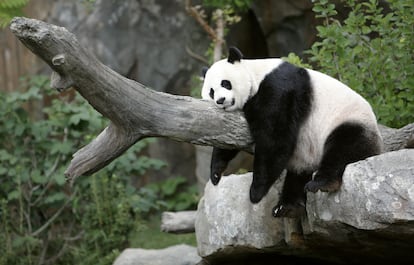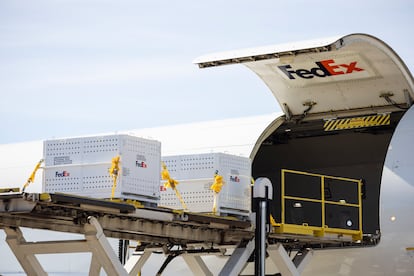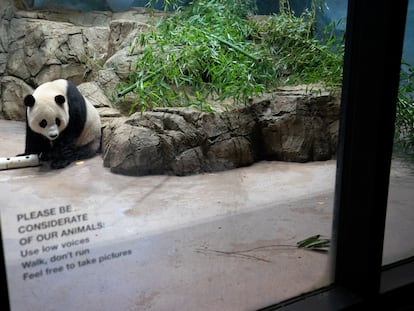The National Zoo bids farewell to its beloved pandas: Is it the end of panda diplomacy?
Only one pair of these bears and their two cubs remain in the United States, in Atlanta. For the first time in half a century, the prospect of having no pandas in American zoos is very real


There are no more panda bears in the nation’s capital after 51 years of being one of the city’s emblems. The trio that has inhabited the National Zoo in Washington, D.C. for almost a quarter of a century left on Wednesday for China in giant cages, in a cargo plane specially equipped for them, on a date that had been kept secret until the last moment for security reasons. With their departure, these once endangered animals are on the verge of disappearing in the United States: only one pair remains, at Zoo Atlanta, and they will return to their country of origin next year. So far, Beijing has shown no signs of being willing to offer its great global antagonist other specimens to replace the returnees.
The pair of adult pandas, 26-year-old male Tian Tian (his name in Mandarin means “more and more”) and female Mei Xiang (“beautiful fragrance”), along with their three-year-old son Xiao Qiji (“little miracle”) face a 19-hour journey aboard a Boeing 777 dubbed “Panda Express” and decorated with the image of one of these animals. They are traveling with more than a hundred kilos of bamboo to feed them during the journey — during which they will stop in Alaska for refueling — as well as fruit to calm them if they show signs of anxiety along the route. They are accompanied by two keepers and a veterinarian until their arrival in Chengdu, central China, where they will be accommodated in one of the panda care parks run by the Association for the Protection of Wildlife in China. There, in the humid, misty mountains filled with bamboo forests that are the ancestral habitat of giant pandas, the trio will live out the rest of their lives with 150 other pandas.
Dozens of people crowded around the zoo’s enclosure in the U.S. capital, closed for the departure of its most emblematic animals, since early in the morning after it was made public the animals would depart this Wednesday. Some cried; others waved their hands as a sign of farewell to the vans that transported the animals to the airport. The agreement between the zoo and the Chinese authorities was due to expire on December 7, but those in charge of the Washington institution preferred to bring forward the return by one month.
It’s hard to overstate the extent to which pandas had become one of the big stars of Washington life since the first pair arrived in 1972. For years, their images decorated subway tickets, they had ice cream flavors named after them... The zoo built an enclosure especially for them, by far the most visited of all its exhibits. Two cameras broadcast live 24 hours a day every second of their movements... or rather, their very abundant and long naps. An army of caretakers and volunteers was assigned to watch over them and monitor every detail of their feeding and health, from their heart rate to their feces and their reproductive instincts. The Chinese ambassador to the U.S., Cui Tiankai, even said once: “Many people don’t know this, but China has two ambassadors in Washington: me and the pandas.”
Now, however, a huge question mark hangs over the future of these animals in Washington and the rest of the United States. For the first time in half a century, the prospect of having no pandas in American zoos is very real.

Temporary loans to allies
China uses its most emblematic animals as a diplomatic tool: since 1984 it has not given away — nor sold — specimens outside its territory, but it does usually lend them for a certain period of time to countries with which it has closer relations, or with which it wants to strengthen them. Any cubs that may be born during the loan abroad, China stipulates, are also property of the Chinese government and must be repatriated after a few years. Some 1,800 pandas — once an endangered species and today only “vulnerable” — currently live in the People’s Republic. Another 65 are in some twenty foreign countries, from Russia to Qatar.
China lends these animals to countries with which it has friendly relations, for a price of approximately $1 million a year. The country does not, however, lend them to countries with which it has tensions. The U.S. is currently its fiercest rival. As loan agreements have expired across the nation, the animals have been returned to their homeland, with no extensions or contracts signed for the arrival of new pandas. Australia and Scotland must also return theirs before the year expires.
In this case, National Zoo authorities maintain that it is simply a question of age. The three pandas have reached a biological stage at which they had to return to China anyway: babies usually return before the age of four, while adults do so in their old age. But the institution had begun a multi-million-dollar project to renovate the panda enclosure, which will be completed in the next eight to ten months.
The Zoo has indicated that the project will continue to move forward pending the arrival of new animals. If it is completed and no other giant pandas arrive, it will be used to exhibit other animals.
The departure of Tian Tian, Mei Xiang and Xiao Qiji is “a moment of joy because this is one more step in 50 years of a successful giant panda conservation program and hopefully the beginning of 50 more years of successful giant panda conservation,” said Zoo director Brandie Smith at the farewell ceremony
“The departure of Tian Tian, Mei Xiang and Xiao Qiji is a joyous moment because this is another step in 50 years of a successful giant panda conservation program, and hopefully the beginning of another 50 years,” said Zoo Director Brandie Smith at the farewell ceremony. “Please know that the future is bright for giant pandas,” she added. “We remain committed to our program, and we look forward to celebrating with all of you when pandas can return to D.C.”
The first pandas arrived in the United States in 1972. The couple Ling Ling and Hsing Hsing arrived in Washington as a gift from then Premier Zhou Enlai to commemorate President Richard Nixon’s trip to Beijing that year, which paved the way for the normalization of diplomatic ties between the two nations.
Then-first lady Patricia Nixon had commented to Zhou, upon seeing a pack of cigarettes with the image of these bears, that she loved them. “I’ll give you some,” the prime minister replied. “Cigarettes?” the president’s wife was astonished. “Pandas!” replied the leader. Two months later, the Chinese white-and-black ambassadors were in the U.S. capital.
Those pandas passed away in the 1990s, leaving no living offspring. But in 2000, Mei Xiang and Tian Tian arrived, through an agreement that stipulated that the pair would live at the National Zoo for 10 years, in exchange for $10 million. Over the years, the two adult pandas have had four live cubs. The first, Tai Shan, was born in 2005. The last, Xiao Qiji, was born in 2020, when veterinarians thought his mother was too old to have more offspring. His arrival, at the height of the pandemic, brought a breath of optimism to an almost ghost town.
In 2011, the agreement was renewed for another five years, and was extended again successively in 2015 and 2020. No further extensions were granted in 2023.
Next year, the pandas in Atlanta — an adult pair and two twin cubs — will return to China. In 2019, a female panda and her offspring, until then housed at the San Diego Zoo, were returned. Ya Ya, another female at the Memphis Zoo, was returned in April. Two months earlier, her companion, Le Le, died of heart disease.
At the farewell ceremony in Washington, the representative of the Chinese Embassy, Xu Xueyan, did not allude to a possible continuation of the panda cession agreements, and limited herself to assuring that her country will continue to work closely with others, including the United States, in the “protection of endangered species.” “As a diplomat in Washington, I say to them goodbye and bon voyage, and as a Chinese government official, I say to them, welcome back,” she said. “Giant pandas belong to China, giant pandas also belong to the world.”
Sign up for our weekly newsletter to get more English-language news coverage from EL PAÍS USA Edition









































